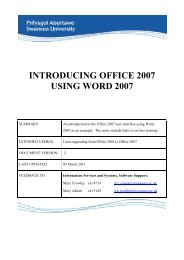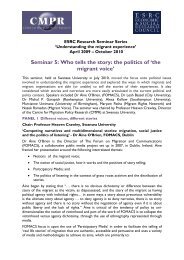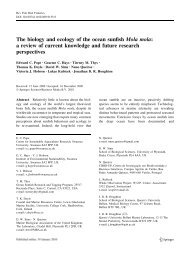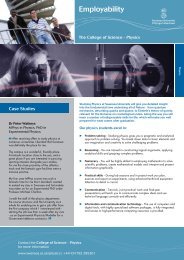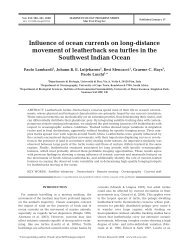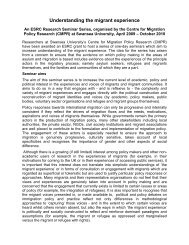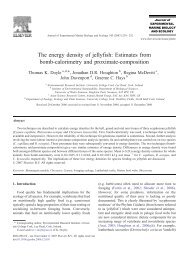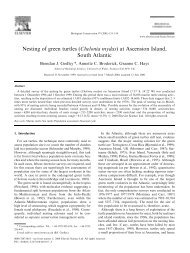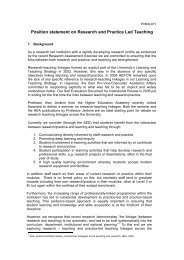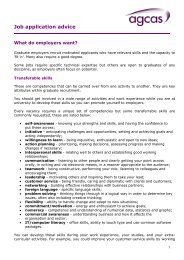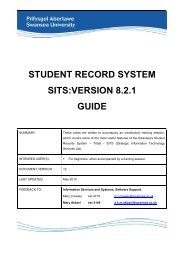Postgraduate Prospectus 2013 - Swansea University
Postgraduate Prospectus 2013 - Swansea University
Postgraduate Prospectus 2013 - Swansea University
Create successful ePaper yourself
Turn your PDF publications into a flip-book with our unique Google optimized e-Paper software.
Psychology<br />
Research opportunities<br />
MPhil/PhD<br />
RAE2008 35% of research in Psychology<br />
rated world-leading (4*) or internationally<br />
excellent (3*)<br />
Professors<br />
P Bennett<br />
D Benton<br />
M Blagrove<br />
T Lloyd-Jones<br />
A Parrott<br />
P Reed<br />
I M Thornton<br />
R L Wood<br />
Academic and research staff 26<br />
<strong>Postgraduate</strong>s 32<br />
Unlocking the secrets of the human mind<br />
is one of modern science’s greatest<br />
challenges. Psychology, the study of<br />
human behaviour, helps us to make sense<br />
of how we understand the world, what<br />
makes us laugh or cry, why we are<br />
conscious, and why we make the choices<br />
we do.<br />
Research degrees in Psychology will:<br />
• Provide you with new and specialised<br />
research and transferable skills such as<br />
presenting to a range of audiences,<br />
publication, and networking<br />
• Prepare you for a career in academic<br />
research and teaching<br />
• Equip you with skills relevant for a<br />
rewarding career in a range of diverse<br />
fields<br />
Research Strengths<br />
Our research is structured around five<br />
strong research groups:<br />
Psychology Applied to Health and<br />
Medicine<br />
Research across this group looks to apply<br />
the principles of psychology to both the<br />
physical and mental health of the<br />
population. Understanding how<br />
behaviours develop and influence<br />
individual’s decision making, alongside<br />
Entry requirements:<br />
MPhil: normally an Honours degree<br />
(2.1 or above) in a discipline related<br />
to the chosen specialty, or a relevant,<br />
approved postgraduate qualification.<br />
PhD: Applicants would normally have,<br />
or be studying for, a Master’s degree.<br />
English Language requirement:<br />
IELTS 6.5 (with a minimum of 6.5 in<br />
each component) or <strong>Swansea</strong> <strong>University</strong><br />
recognised equivalent.<br />
the cognition-health interface and studies<br />
into clinical or behavioural change<br />
interventions, are crucial in protecting the<br />
long-term health and well-being of the<br />
population. Examples of research include:<br />
• Coping with health threats<br />
• Adverse effects of recreational drugs<br />
• Nutrition, obesity and body image<br />
• Occupational health<br />
Learning and Behaviour<br />
This group examines the mechanisms that<br />
allow behaviour and thoughts to adapt to<br />
the environment, and investigates the role<br />
of learning and memory processes in<br />
generating such flexible and adaptive<br />
behaviours. These behaviours allow<br />
efficient learning and processing of<br />
information in a wide variety of contexts,<br />
across the age range, and even across<br />
species. Although adaptiveness and<br />
flexibility promote psychological wellbeing,<br />
there can also be unfortunate<br />
negative effects of these behaviours.<br />
Examples of research include:<br />
• Autism and early interventions<br />
• Schizophrenia<br />
• Reward sensitivity theory<br />
Cognition and Perception<br />
Our work in this field spans research into<br />
areas such as the perception, identification<br />
Scholarships and Bursaries<br />
A range of postgraduate scholarships<br />
and bursaries is available. For details,<br />
please visit: www.swansea.ac.uk/<br />
scholarships/<strong>Postgraduate</strong><br />
We attract substantial research funding<br />
from a range of organisations, including<br />
the ESRC, the European Union, the Health<br />
and Safety Executive, the Leverhulme Trust,<br />
the Nuffield Foundation, the British<br />
Academy, the Wellcome Trust, the Welsh<br />
Government, and the EPSRC.<br />
and processing of static and dynamic<br />
visual objects and events, or the inhibitory<br />
processes involved in memory and<br />
forgetting in both the theoretical and<br />
applied setting. Work is also underway<br />
on the cognitive and neural basis for word<br />
recognition and production, including the<br />
study of language development in monoand<br />
bi-lingual speakers. Examples of<br />
research include:<br />
• Causes and mechanisms of dyslexia<br />
• Object and face recognition<br />
• Biological motion<br />
Brain and Behaviour<br />
This research group is exploring the<br />
integration of neuroscience and behaviour.<br />
One such area is brain chemistry and the<br />
effect of eating, nutrition, and recreational<br />
drug use on cognition, mood and<br />
behaviour. The interface of<br />
neuropsychology and brain injury is also<br />
proving to be of interest highlighting the<br />
consequences of dyslexia, other reading<br />
disorders, and closed head injuries. Work<br />
is also underway to apply EEG and<br />
neuro-feedback research to clinical<br />
disorders and sleep. Examples of research<br />
include:<br />
• Psychopharmacology<br />
• Brain injury rehabilitation<br />
• Addiction and substance misuse<br />
How can I find out more?<br />
Visit our website:<br />
www.swansea.ac.uk/<br />
humanandhealthsciences/research<br />
Contact:<br />
Maria Davis, <strong>Postgraduate</strong> Administrator<br />
Email: a.m.davis@swansea.ac.uk<br />
Tel: +44 (0)1792 295309<br />
Evolutionary Behavioural Science<br />
This group explores how evolution and<br />
the credo ‘survival of the fittest’ prevails<br />
within our current society, and goes on to<br />
influence our continued development and<br />
growth through the exploration of<br />
modern day relationships and<br />
interactions. For example, why are some<br />
people jealous and possessive in their<br />
relationship while others take a more<br />
relaxed approach? Examples of research<br />
include:<br />
• Mating behaviour and relationships<br />
• Altruism and aggression<br />
• Philosophical implications of evolution<br />
Students working towards a research<br />
degree have the opportunity to attend<br />
taught modules from any of the taught<br />
masters available within the College of<br />
Human and Health Science. In addition,<br />
students in the first year of their MPhil/<br />
PhD research degree are encouraged to<br />
attend the statistics and computing<br />
components from the MSc in Research<br />
Methods along with a number of<br />
transferable skills courses available to<br />
all postgraduate students at <strong>Swansea</strong><br />
<strong>University</strong>. Research students are also<br />
encouraged to disseminate their own<br />
research findings at national and<br />
international conferences.<br />
Visit the <strong>University</strong>:<br />
see page 174 for details and Open Day<br />
information<br />
Applications can be made online<br />
at: www.swansea.ac.uk/applyonline<br />
– see pages 176 – 177 for further<br />
information<br />
For details of Master’s courses available<br />
in Psychology, please see page 84.<br />
Our specialised research facilities<br />
available include a sleep laboratory;<br />
computer controlled visual and auditory<br />
displays for work on perception,<br />
attention, memory and language; an eye<br />
movement laboratory and a nutrition<br />
laboratory. In addition, our researchers<br />
and students have access to state-of-theart<br />
fMRI brain scanner and EEG facilities.<br />
Research Degrees – Psychology<br />
138<br />
139



